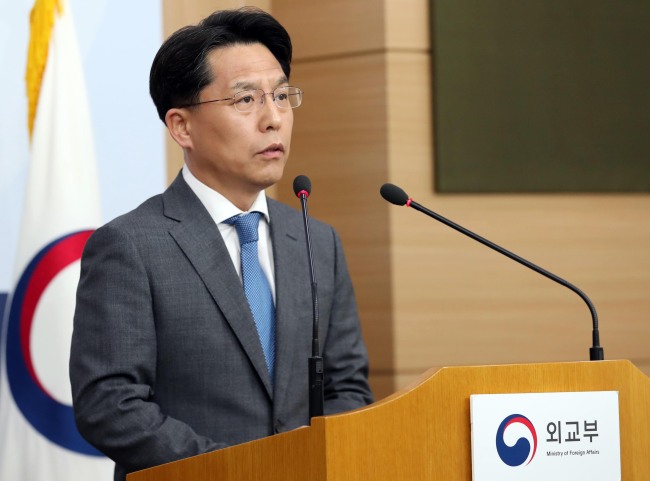South Korea expressed hope Tuesday that North Korean leader Kim Jong-un's ongoing visit to China will help facilitate the denuclearization process, saying Seoul and Beijing share that strategic goal.
"Our government expects China to play a constructive role in order to resolve the issue," Noh Kyu-duk, spokesman for the Ministry of Foreign Affairs, said at a press briefing.
China is expected to make a contribution to the denuclearization of the North through Kim's trip there, he added.
Kim arrived in China earlier in the day by his Chammae-1 special aircraft, making his third known visit to the communist ally since March.
 |
(Yonhap) |
Kim will likely brief President Xi Jinping in detail on the results of the Singapore summit and discuss a next step.
China has stated that it wants the peaceful denuclearization of the Korean Peninsula for regional stability and a peace treaty to formally end the fighting seven decades ago.
Many, however, still question its role amid Beijing's typical ambiguity on its diplomatic strategy.
At issue is whether close ties between the traditional communist allies that share a porous border would be conducive to maintaining the dialogue mood. Beijing has repeatedly said it's committed to implementing the UN Security Council resolutions against Pyongyang.
Ironically, China is a potential challenge to putting pressure on the North as it is Pyongyang's biggest benefactor. China is concerned about a possible massive inflow of North Korean refugees.
Beijing also does not want to be sidelined in the regional peace process.
Following Kim's previous talks with Xi in China early last month, the North released strongly-worded statements against top US officials.
Trump could barely contain his disappointment.
"When Kim Jong-un had the meeting with President Xi ... I think there was a little change in attitude from Kim Jong-un. So I don't like that," he said at that time.
Experts here said Kim's visit to China reflects the strategic interest of the both sides. Kim is in need of Beijing's continued backing and Xi hopes to maintain his country's diplomatic leverage over Pyongyang.
"It's part of North Korea's version of balanced diplomacy," said Kim Hyun-wook, a professor at the National Korea Diplomatic Academy.
The North Korean leader's purpose is to maximize gains, including China's economic assistance, by use of its influence in negotiating with Washington, he added.
Chung Jae-heung, a researcher at the Sejong Institute, said Kim and Xi are likely to discuss the issue of declaring an end to the Korean War and signing a peace treaty.
"China is apparently sensitive to the possibility that it will be marginalized amid talk of the two Koreas and the US declaring the end of the war," he pointed out. (Yonhap)







